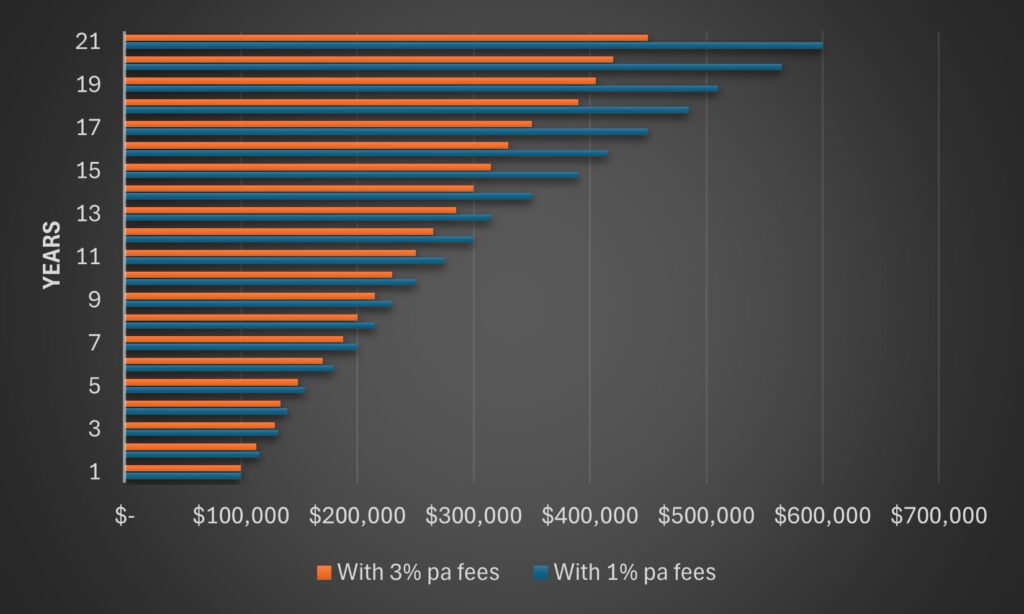Fees: It’s not about how much money you make but how much money you keep.
When investing in the stock market, there are several types of fees and expenses that you may encounter. Investment fees are fees charged to use financial products. These fees can vary depending on the brokerage or investment platform you use, as well as the specific investment products you choose which may have a significant impact on your investment’s performance over time. Here are some common types of fees associated with stock market investing:
- Brokerage Commissions: These are fees charged by your brokerage for executing trades. They can be a fixed amount per trade or a percentage of the trade’s value. Many brokerages have moved to commission-free trading in recent years, but some may still charge fees, especially for options and other specialized trades.
- Management Fees: If you invest in mutual funds, exchange-traded funds (ETFs), or other managed investment products, you may pay a management fee. This fee compensates the fund manager for their services and is typically expressed as an annual percentage of your assets under management (e.g., 1% per year). Mutual funds tend to have much higher fee structures associated with them than exchange-traded funds designed to follow an index, such as the S&P 500 index.
- Expense Ratios: For mutual funds and ETFs, the expense ratio represents the total annual costs, including management fees and other operational expenses, as a percentage of the fund’s assets. It’s important to consider the expense ratio when investing in these products.
- Front-End Load: Some mutual funds charge a front-end load, which is a sales charge or commission that is deducted from your initial investment when you purchase shares. This reduces the amount of money actually invested in the fund. We do not recommend investing in such funds as this front-end load significantly impacts your initial investment amount. Furthermore, mutual funds that charge such “entry fees” typically have relatively high annual management fees as well associated with them.
- Back-End Load (or Deferred Sales Charge): This fee is applied when you sell shares of certain mutual funds. It is deducted from the proceeds of the sale and can decrease your overall returns.
- Account Maintenance Fees: Some brokerages may charge fees for account maintenance or inactivity. These fees can add up over time, so it’s essential to be aware of them and choose a brokerage with fee structures that suit your investing habits.
- Margin Interest: If you borrow money from your brokerage to invest (margin trading), you’ll be charged interest on the borrowed funds. The rate can vary depending on the brokerage and the amount borrowed.
- Wire Transfer Fees: If you need to transfer funds in or out of your brokerage account, wire transfer fees do apply. They vary depending on the platform once choses as well as the intermediary banks involved in the transactions.
- Options and Futures Fees: If you trade options or futures contracts, there may be additional fees and commissions associated with these trades. Typically we would not advise on such trading strategies.
- Exchange Fees: Depending on the currency you hold and the markets you wish to invest in, currency exchange fees will apply. Their amount depends on the expense ratios of the exchanges.
- Transfer Fees: If you decide to transfer your investments to another brokerage account, the current broker platform may charge a fee for the transfer.
It is essential to understand the fees associated with your investment in order to avoid detrimental results to your investment returns, as the graph on the left illustrates for an investment portfolio of 100,000 USD with an increase rate of 6% p.a. and an annual contribution of 10,000 USD fees have a significant impact on your investment performance over the long run.
The average cost of owning a mutual fund is 3.17% per year, while you may own a low cost ETF such as the VOO Vanguard 500 Index fund which tracks the S&P 500 index for a fee as low as 0.03% per year while keeping in mind that over the long run the benchmark index has outperformed 96% of all actively managed Mutual Funds.
The Teams at Society and PP Investment Education are available for you to assist in my ways from reviewing an existing portfolio to setting up a smart investment structure with optimized fees. The sooner you optimize your asset portfolio, the sooner you will be able to realize your dreams and secure a brighter financial future. You can contact Mr. Vladimir Popovski by sending an email to vladimir.popovski@society-network.com.




